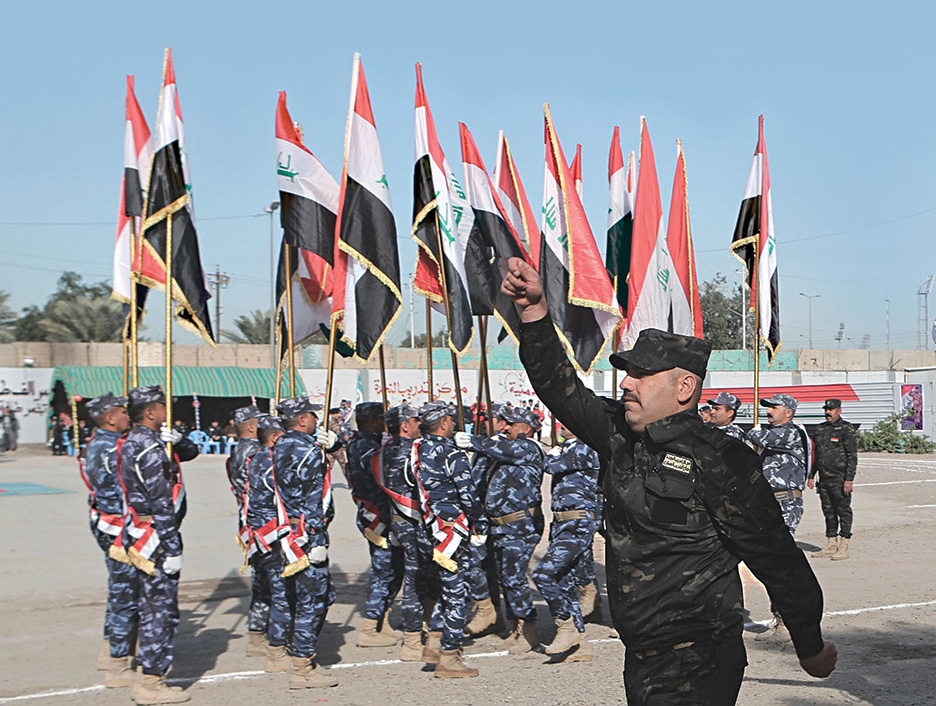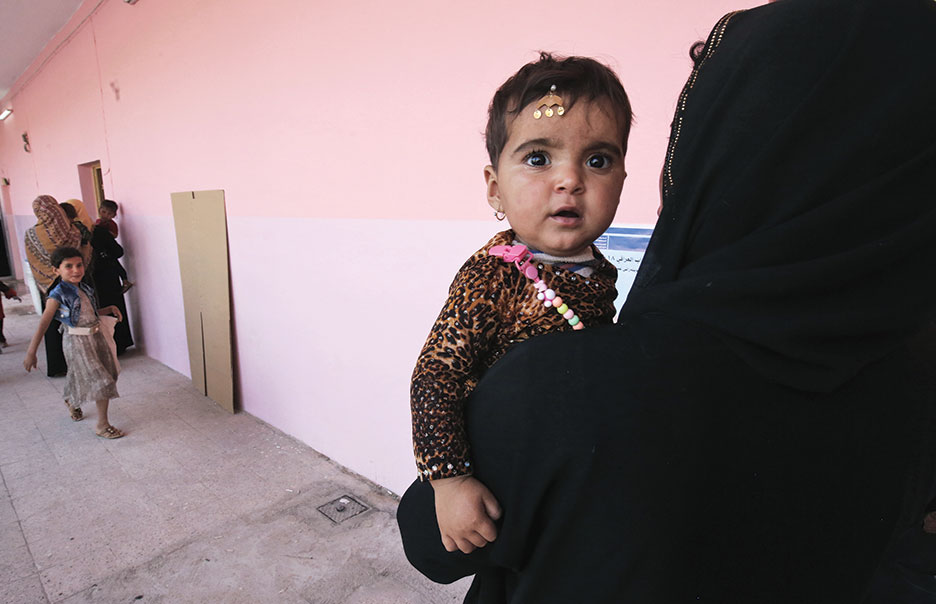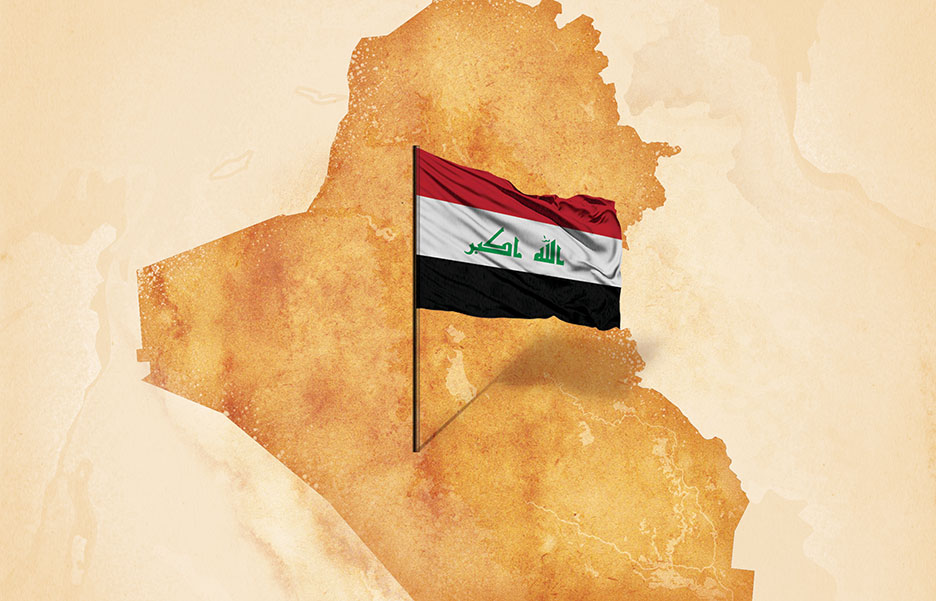Iraq’s Interior Ministry builds professionalism with postgraduate degrees in modern policing
After our security forces achieved great victories over Daesh terrorists, the need to develop and train skilled personnel to fortify the domestic front has become an indispensable requirement enabling Iraq to join the ranks of secure major powers.
Having felt the need to find ways to shape minds, the Iraqi Ministry of Interior has granted the Higher Institute for Security and Administrative Development space to open more than one postgraduate diploma program in specializations that will achieve quantum leaps, accelerating the education process and saving time.
Dean of the Higher Institute Maj. Gen. Dr. Yasser Abdul Jabbar Mohammed described the path to creating the curriculum to achieve a postgraduate diploma:
“We cannot achieve different results — results that meet our ambitions and aspirations — if we take the same routes,” the general said. “We promised ourselves as officers and employees of the Higher Institute that we would bring about change. We noticed the impact specifically in the Graduate Studies Section, where courses were abridged and limited in qualifications, and the curricula lacked a clear focus. This adversely cast a shadow over accreditation of well-established university institutions in our beloved Iraq.”
The Higher Institute’s Board of Directors therefore held a meeting, chaired by the Senior Undersecretary Aqeel Al Khazali. Other participants included the minister of interior advisor Lt. Gen. Yassin Al-Yasseri, the inspector general, the dean of the Police Academy, the dean of the Higher Institute, the Institute’s assistant academic dean, and the director of the Graduate Studies Section.

The objective was to draw up an academic and training road map. The most important path on the map was to concentrate on matching the qualifications of the candidate for admission to the specialization in the postgraduate diploma program. This was in addition to expanding academic offerings, adopting a master’s degree curricula in the faculties of the University of Baghdad, enriching the curricula in those faculties by bringing in graduate studies professors, and adopting curricula, units, credit hours and selection mechanisms.
Some of this well-considered security curricula is Creating Sustainable Security, by the senior undersecretary; Ways to Combat Corruption, by the inspector general; and Private International Law, Citizenship and Residence, and Field Applications, by Lt. Gen. Yassin Al-Yasseri. Other topics will focus on intelligence efforts and quality operations.
With God’s blessing, three departments were launched at the 28th session of the Higher Institute: Law and Criminal Policy, Security Management, and Technology and Information Security. The deanship of the Faculty of Law, represented by Dean Dr. Ali Mutasher, played a prominent role in planning the academic curricula, while Faculty of Management Technology Dean Dr. Sattar Al-Bayati, Dr. Sarmad Al-Shamri, Dr. Baidai’, and a select group of senior management sciences professors played a role in nurturing and supporting the Security Management Department.
Al-Nahrain University, represented by its President Dr. Nabeel Kadim Abid Al-Sahib, Dean of Information Technology Mohammed Zaki, Dr. Mahmoud, Dr. Bayan, and a select group of accredited information technology professors, contributed to shaping minds to create qualitatively elite officers (Slogan: Our Tomorrow Is Better Than Our Today), as ordered by the esteemed minister of interior.
It also fulfills the senior undersecretary’s aspirations to distinguish the Interior Ministry and enrich educational and training goals in an unparalleled way. Thus, under the leadership’s auspices and guidance, we will proceed to open two essential departments in the field of reinforcing security and public order: Security Media and Criminal Psychology. We are also planning, in the short term, for the launch of the Public Policy and Development Department and the Security Studies Department, in English, within the requirements for earning the postgraduate diploma in Internal Security Forces Sciences.

Theses written by postgraduate students were reviewed for language by more than 70 university professors who hold doctorates. More than 70 other professors also participated to evaluate the theses academically in accordance with sanctioned university academic and methodological processes. We also involved more than 350 professors and ministry leaders with advanced degrees and experience to discuss the research and enrich it with corrective comments. These participants included university presidents, deans of faculties, academic department chairs, legal scholars, and veteran academics, who all came to be impressed with the academic transformation and intellectual and methodological enrichment experienced by the ministry’s officers. They called on the officers to launch a new, final curriculum based on the slogan “The Ministry of Interior Reborn.”
Maintaining a commitment to discipline among the ranks of the students is one of the most important goals after they are admitted.
Jurist Brig. Gen. Haitham Abdul Jabbar Kazem, the administration and finance assistant at the Higher Institute, noted that military discipline reigns at the institute. In return, the institute provides for student officers’ needs for the duration of their studies.
“This originates in the institute’s belief that academic personnel must be refined and trained to be the core of a well-structured institution,” Brig. Gen. Haitham said. “From the first moment the student officers are admitted, they are read the rights they enjoy and the duties placed on their shoulders for the duration of the course. These rights include the provision of adequate housing set up for study and that they will be equipped with everything to ensure the success of their educational progress, outfitting them with modern laptops, rooms equipped with the latest devices and furnishings, and other materials.”
Aside from possessing one of the most important libraries among security institutions, the institute also provides a gymnasium for exercise and recreation and vehicles to transport postgraduate students to and from the main gates to lessen the burden on those who do not have a private car. Students are required to adhere strictly to military discipline, from wearing the uniform to being on time for lectures, as well as engaging seriously with the lecturing professors.
Brig Gen. Haitham belongs to a committee set up to identify applicants’ readiness and knowledge of their specialization. The committee learns more about the applicant’s personality, capabilities, manner of answering questions, and dress. It notes his adherence to the official uniform and attention to grades and ranks, all of which qualify the officer for a seat in the postgraduate diploma program.
Brig. Gen. Dr. Ammar Jasem Hashem, associate academic dean at the Higher Institute, focused on creating specializations that paralleled the ministry’s responsibilities. The nature of the tasks placed on the shoulders of the security establishment for all the ministry’s divisions shaped the sciences and knowledge necessary for the students in the postgraduate diploma program. (criminal law, information security, security media and criminal psychology).
Officers must hold the rank of captain and higher, provided that they are no older than 45 and have a bachelor’s degree in the desired specialization. The academic units are arranged successively to increase the officers’ expertise in the various facets of the security sector as appropriate to the nature of the mission and the necessities arising from security challenges, as well as the needs the ministry anticipates and the type of service it offers in its various divisions.
The curriculum mimics postgraduate diploma and master’s programs in Iraqi universities, with the addition of enriching lectures and systematic lessons in security and management sciences in all departments. When practical experiences are blended with knowledge, the Ministry gains scientifically qualified personnel well versed in the law. Judgments and orders will therefore be implemented and enforced in a way that leaves no room for doubt, because the Higher Institute is the only institution in the ministry that grants postgraduate degrees.
Research is conducted along the lines of Iraqi universities. Dr. Ismail Obaid Alwan, director the Graduate Studies Department, said students require the approval of academic committees to begin research and must do so under the tutelage of two academic advisors, one an academic from the Ministry of Higher Education, the other a professional from the Ministry of Interior with a degree, expertise, and experience in police work.
Lt. Col. Nateq Shaker, director of Registration and Admissions, said the application process begins when the Higher Institute approaches the agencies and all their offices and informs them that a session is opening for the postgraduate diploma and how applicants are received. Groups of applicants are scheduled through committees that the Higher Institute’s deanships form for organizing the files, entering data electronically, and conducting physical fitness tests, a medical examination, and computer and English language tests.
To ensure that everyone is treated fairly and that the worthiest applicants receive seats in the postgraduate program, there is a written competitive examination in addition to the personal interview and other required exams. The Higher Institute’s deanships provide specialized questions and general police questions through a specialized academic committee by asking the applicants questions. The officers applying compete to provide the appropriate answers, which are then presented to a grading committee, which assigns the scores. Through the lines he writes during the examination, the officer demonstrates his personality and knowledge in general and in his specialization. This gives him the chance to shine competitively.
“We have a comprehensive database of those who are not admitted for the session, which is retained after archiving,” Lt. Col. Nateq said. “As for those who meet all the requirements and pass the tests, we send their files to the Graduate Studies Section to enroll them in the desired session.”

Interior Ministry Serves Mosul
As a service to citizens of the liberated region, over 1.6 million identity papers have been processed
AHMAD SAAD, Al HARIS, BAGHDAD
After invading Mosul, Daesh terrorist gangs tried to obliterate the identity and culture of the city — carrying out a rabid campaign of destruction of monuments, setting fire to all government files and destroying its institutions.
They started by destroying proof of identification papers for all citizens. They had planned the ethnic and demographic cleansing of the population but failed in the face of the great effort exerted by members of the Directorate of Civil Status, Passports and Residence of Nineveh governorate under the Ministry of the Interior.
Brig. Gen. Dr. Khalid Awni Khattab, director of the department, explained how he and his staff coped with the crisis.
“Operations at the Nineveh Governorate Civil Status Directorate were halted for a period of six months when the terrorist gangs took control of the governorate. In the meantime, the General Directorate of Nationality activated an alternate civil status directorate for Nineveh at the offices of the Civil Status Directorate on Al-Rashid Street in Baghdad. It operated for six months until another site was selected for Nineveh’s Civil Status Directorate,” the brigadier general said.
The directorate was restructured after obtaining official approvals from the Ministry of the Interior. Thereafter, the Nineveh Nationality Directorate began issuing civil status and Iraqi nationality identity cards for displaced citizens outside the city of Mosul at its alternate site in Shekhan district in January 2015. Other offices were opened in the governorates of Baghdad, Najaf, Dohuk and Erbil.
“All of these offices started receiving citizens and processing their paperwork until the city of Mosul was freed. Once it was cleared and restructured, work was resumed at the offices of the Nineveh Civil Status Directorate [CSD],” Brig. Gen. Khalid said. “Operations are ongoing at all branch circuits of the Nineveh CSD; not a single CSD office in Nineveh governorate is halted. All are working hard to complete citizens’ paperwork and issue the documents they need.”
Brig. Gen. Khalid confirmed that paperwork is processed exclusively in the Nineveh governorate. The substitute offices were no longer needed and were closed by the ministry. The workload is intense. The director noted that the CSD completed 1.63 million documents in 2018, including civil status identity documents, passports, nationality certificates, and information cards.
The Nineveh CSD coordinates wonderfully with the Kurdistan region, where the directorate’s detachments serve camps of displaced people and provide residents a means to submit their paperwork to be processed at the circuit offices. The completed documents are delivered to the citizens in the camps.
Nineveh CSD is rehabilitating a suitable building in accordance with the nationality identity card project implementation plan, including halls, computers, visitor amenities and waiting rooms. Once these preparations have been completed, new circuit offices will be activated, one after another, and absorbed into the unified national identity card system.
“This national identity card system will most certainly start to be used in the near future in the Nineveh Civil Status Directorate,” Brig. Gen. Khalid said.
Nineveh governorate has one airport, Mosul Airport, and one border crossing, Rabia border port, but neither is operational.
The governorate’s lone active passport office is insufficient to handle the heavy flow of paperwork in Nineveh governorate, where the population exceeds 4 million. But the passport office operates morning and evening shifts to provide better service to citizens and improve and accelerate document processing as much as possible, considering the available staff. As of early 2019, about 800 to 1,000 passports were issued daily.
Brig. Gen. Khalid stressed his intention to reopen the other Nineveh passport office in the governorate complex as soon as the building is ready. That building hosts the CSD because its original building was destroyed. Once a new building is ready for the CSD, the other Nineveh passport office will reopen. There is also a proposal to open a third office, in the district of Tel Afar.
The Ministry of the Interior’s actions exemplify the great strides made by the Iraqi government in restoring services to districts liberated from terrorism. Such actions restore citizens’ faith in government and reduce the appeal of extremists’ messaging.

